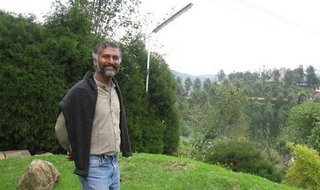
Pratim is an ecologist, who grew up in Pondicherry and has been working since 1995 in the Nilgiri mountains of south India.
Pratim is a founder-member of Keystone Foundation, an organisation devoted to the social, economic and cultural empowerment of the indigenous Kurumba and Irula communities of the Nilgiris.
Collecting wild honey from the mountain cliffs and overhangs has been their traditional occupation, and defined their life and culture. Keystone has helped these honey-hunter communities to emerge from marginality and gain stable livelihood and dignity from their traditional occupation.
The name “Keystone” emerges from the nest-building behaviour of some birds in nature. These permanent nest structures serve as habitat for several life forms. Such Keystone species become crucial in providing opportunities for other associated beings to grow and evolve. Thus, Keystone Foundation is born out of a simple ecological principle of the interdependence of natural systems.
The work of Keystone has now spread to the wider Nilgiri Bio-reserve Zone, which lies in the states of Tamil Nadu, Karnataka and Kerala.
Keystone Foundation is based in Kothgiri (near Ooty, in Tamil Nadu). I had been there in 1996, when Pratim, his wife Sneh and their colleague Mathew were just beginning their work, and were talking about their plans.
I was in Kothgiri again recently – and was overwhelmed and inspired by the huge advances made by Keystone in terms of making a tangible difference in the lives of the honey-hunting communities.
Some months after my visit in 1996, I had come across the lines in the Holy Koran about the bee. That had been most inspiring, and I had remembered Pratim and Keystone in that connection.
“And thy Lord inspired the bee, 'Take to houses in the mountains, and in the trees, and in the habitations they build.
'Then eat from every fruit, and walk in the beaten paths of thy Lord;' there cometh forth from her body a draught varying in hue, in which is a cure for men; verily, in that are signs unto a people who reflect.”
Sura 16, "The Bee", verses 68-69.
During my recent visit to Keystone, I remembered these lines on the bee, and mentioned this to Pratim.
Now I am going to get these lines rendered in calligraphy on hand-made paper, and illuminated, and frame this and present it to Keystone - as a heartfelt humble token, of my prayers for ever greater strength and effectiveness in their work, with and for the honey-hunters of the Nilgiris.


6 comments:
What an interesting post! I've learned something today. Thank you.
As Deb said, I've learned lots of great people today too.
Thanks!
I have never come across that quote from the Koran. I hope each of us can be as transformative in our lives as is the honey of the humble bee.
I know your friend will appreciate your gift, which embraces everything that you love - the bee keepers, the growth of the community, your friendship, and the story in the Koran. Done in Persian calligraphy, it will be beautiful.
the Arabic script is the most beautiful for calligraphy. I want to learn it! Yesterday I visited my newsagent who was poring over his newspaper in Urdu. The Arabic script is used for other languages as well as Arabic: Urdu and Malay are two examples.
Can you read it, Rama?
Yves, the Urdu script is based on the Farsi (Persian / Iranian) script and the Arabic script. I did start learning it some years ago, but did not continue. So now I'm back to zero! Best, rama
Post a Comment